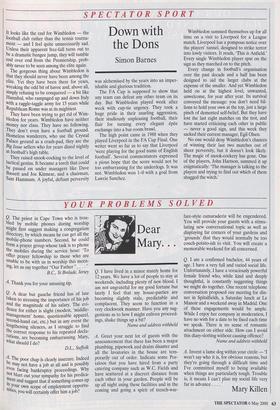SPECTATOR SPORT
Down with the Dons
Simon Barnes
It looks like the end for Wimbledon — the football club rather than the tennis tourna- ment — and I feel quite unnecessarily sad. Unless their apparent free-fall turns out to be a dramatic bungee jump, they will tumble end over end from the Premiership, prob- ably never to be seen among the elite again. The gorgeous thing about Wimbledon is that they should never have been among the elite. Yet they have been there for years, wreaking the odd bit of havoc and, above all, simply refusing to be conquered — a bit like Hannibal, who rampaged up and down Italy with a raggle-taggle army for 15 years while Republican Rome was at its mightiest.
They have been trying to get rid of Wim- bledon for years. Wimbledon have neither money nor class. They have no following. They don't even have a football ground. Homeless wanderers, who use the Crystal Palace ground as a crash-pad, they are the Big Issue sellers who for years dined nightly at football's high table. They raised snook-cocking to the level of tactical genius. It became a torch that could be passed on under managers like Dave Bassett and Joe Kinnear, and a chairman, Sam Hammam. A joyful, defiant perversity was alchemised by the years into an imper- ishable and glorious tradition.
The FA Cup is supposed to show that any team can defeat any other team on its day. But Wimbledon played week after week with cup-tie urgency. They took a huge pride in their snarling aggression, their studiously unpleasing football, their flair for turning every elegant epee exchange into a bar-room brawl.
The high point came in 1988 when they played Liverpool in the FA Cup Final. One writer went so far as to say that Liverpool `were playing for the good name of English football'. Several commentators expressed a pious hope that the score would not be too embarrassing for the underdogs. It was not. Wimbledon won 1-0 with a goal from Lawrie Sanchez. Wimbledon summed themselves up for all time on a visit to Liverpool for a League match. Liverpool has a pompous notice over the players' tunnel, designed to strike terror into lowly visitors. It reads, 'This is Anfield.' Every single Wimbledon player spat on the sign as they marched on to the pitch.
Every change in football's organisation over the past decade and a half has been designed to aid the larger clubs at the expense of the smaller. And yet Wimbledon held on at the highest level, unwanted, unwelcome, for year after year. Its survival conveyed the message: you don't need bil- lions to hold your own at the top, just a large pinch of demented self-belief. But they have lost the last eight matches on the trot, and have started criticising each other in public — never a good sign, and this week they sacked their current manager, Egil Olsen.
No one would deny Wimbledon's chances of winning their last two matches out of sheer perversity, but it doesn't look likely. The magic of snook-cockery has gone. One of the players, John Hartson, summed it up enigmatically: 'The manager is talking to the players and trying to find out which of them shagged the witch.'


































































 Previous page
Previous page